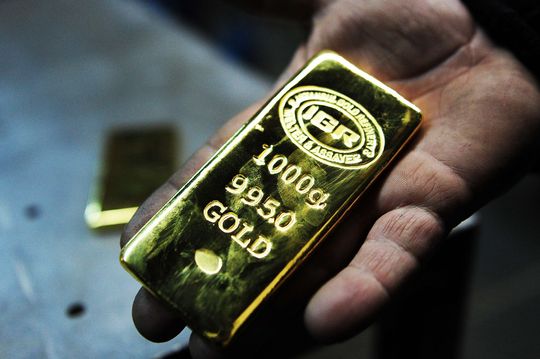Silver futures drop 4.7% in the second quarter
Gold futures finished higher on Friday, finding support after three-consecutive session declines, but posted the largest monthly loss since February.
Prices for the precious metal also marked their first quarterly loss since the third quarter of last year, with prices pressured by rising expectations that the Federal Reserve will raise interest rates at its next two policy meetings.
Price action
- Gold futures for August delivery GC00, -0.11% GCQ23, -0.11% climbed by $11.50, or 0.6%, to settle at $1,929.40 per ounce on Comex. Prices based on the most-active contract fell just 20 cents for the week, and lost 2.7% for the month and 2.9% for the quarter, according to Dow Jones Market Data.
- Silver futures for September delivery SI00, 0.11% SIU23, 0.11% rose 22 cents, or 1%, to $23.02 per ounce, gaining 3% for the week. Prices, however, lost 2.4% for the month and 4.7% for the quarter.
- Palladium for September delivery PAU23, 1.06% shed $5.40, or 0.4%, to $1,222 per ounce, with prices down 16.8% for the quarter, while platinum for October delivery PLV23, -0.19% added $6.40, or 0.7%, to $913.20 per ounce, posting a second quarter loss of 9%.
- Copper for September delivery HGU23, 0.96% gained 6 cents, or 1.6%, to $3.76 per pound. Prices for the industrial metal declined 1.2% for the week and rose 3.4% for the month, but lost 8.2% for the quarter.
Market drivers
Robust U.S. GDP and jobs data released on Thursday pointed to further Fed rate hikes in the months ahead, said Han Tan, chief market analyst at Exinity Group.
The U.S. gross domestic product reading was revised higher, showing that the economy grew at a solid 2% annual pace in the first quarter, from a previously reported 1.3% growth rate. Meanwhile, government data showed new jobless claims declined by 26,000 to a one-month low of 239,000.
On Friday, data revealed that the cost of U.S. goods and services rose by a scant 0.1% in May, but that prices were still rising in key parts of the economy. Consumer spending, however, edged up by a lower-than-expected 0.1% in May.
Markets have ramped up expectations for a July Federal Reserve interest-rate hike, and the CME’s Fed Watch Tool also shows a nearly 69% chance of an additional 25 basis point hike in September. “Such revised odds are prolonging the slump in zero-yielding gold,” Tan told MarketWatch.
As long as the Fed keeps its benchmark rates well above 5% and delays the prospects of a rate cut, that “should extend the wait for bullion bulls before prices can see a meaningful recovery, barring any sudden spike in geopolitical tensions or recession fears in the interim,” he said.
Prices for gold ended lower for the month as well as the quarter, paring their year-to-date gain.
Overall, it’s been a “painful quarter” for gold prices, said Marios Hadjikyriacos, senior investment analyst at XM. “With equity markets going into overdrive and recession nerves calming, demand for safe haven assets suffered a major blow, and the sharp rally in real yields didn’t do gold any favors either.”
Gold has had a topsy-turvy quarter. Prices peaked in early May at the second-highest settlement on record for a most-active contract when it finished at $2,055.70 an ounce on May 4.
The highest settlement level on record for the yellow metal arrived on Aug. 6, 2020, when prices finished at $2,069.40 per ounce, according to Dow Jones Market Data.
Then commenced a decline that has seen the most-active contract shed more than $100 an ounce, in part due to warnings from central banks, including the Federal Reserve, that they would push interest rates even higher to try and tame inflation more quickly.

